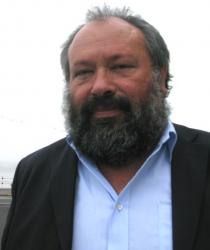
“A major axe that I have to grind,” says Tim Crocker, “is that some people seem to think that everything can be first taught academically and then done and perfected later, rather than the other way around. No-one questions that great sportsmen and musicians should achieve their results through practice and muscle memory. However, large sections of the media and the academic world seem to have forgotten that the intellect behaves the same way, if it is allowed to. Something has gone missing somewhere.”
Tim makes his point as a direct contrast to the schooling that he received at Bedales, for which he retains immense gratitude. “I was very lucky that I received both an academic education and a craft-based education,” he emphasises. “I went through Dunannie, Dunhurst and Bedales and, as my contemporaries and I have often agreed, the further back you went at the schools, the greater the inculcation of those craft-based values. When I was five, someone taught me to sew; at six or seven, I could produce pottery that was a fair representation of what it was intended to be; I still have an oak table at home that I made when I was nine.” Tim is less enthused by the practical skills of the students of the twenty-first century. “I have found that recruiting technicians with an adequate standard of hand-eye co-ordination is almost impossible,” he laments. “The most natural electronics technician that I’ve ever seen had actually trained initially as a jeweller!”
Today, Tim’s businesses cover a multitude of engineering and green technology interests – Scimar Engineering spans the scientific and marine industries and spawned Green Energy Technologies Ltd; Tradewinds Turbines manufactures vertical axis wind turbines, based on sailing technology. Tim is also a leading light of the SME Innovation alliance, a not-for-profit organisation that champions the interests of smaller high-tech enterprises. Such an enormous portfolio has evolved from the efforts of someone who studied physics at Bristol University precisely because it would give him the chance to do the widest possible range of engineering. “Engineering degrees themselves were too prescriptive for me, while maths seemed much too abstract, so physics was the obvious choice,” Tim recalls.
For the next few years after his studies, Tim’s intellectual curiosity set him on a variety of different paths, beginning at an oil surveying company. “I was sent to Libya, which was fabulous, since you could earn about twenty times the graduate salary in those days,” he laughs. “It was a break from academic life, and it was like playing with a huge toy set, rolling around the desert in 60-ton trucks!” The return to an engineering company in the UK came as a rude awakening to Tim. “It was routine work that I was doing and everything was dire. Management was dire, under-management was worse, morale was awful and the unions were understandably awful as a result. It was not a happy time,” Tim winces at the memory.
A desire to go to sea partly prompted Tim’s next move, which was a five-year spell at HM Institute of Oceanographic Sciences. Here, Tim began to reflect on the green technological possibilities that were just beginning to gain wider currency. “It was probably then that I first remember thinking that you couldn’t keep pulling oil out of the ground forever,” he acknowledges. Life in the public sector was something of a curate’s egg for Tim. “It was a great place to be in many ways,” he says. “A lot of clever people were your colleagues and you could do a lot of interesting things.” Effective management, however, was still something of a stumbling block. “Whatever one thinks of oil companies, they know about management,” Tim insists. “The public sector doesn’t have a clue, unfortunately, and eventually, I couldn’t stand it.”
So to the commercial world, where Tim is following in the footsteps of inspirations such as I.K.Brunel. “Well, yes, Brunel’s a bit of a hero around these parts,” says the Exeter-based Tim. “I’ve always been attracted to making things, which has always seemed to me to be a noble pursuit, and the science, where the UK remains among the best in the world, still fascinates me. On the business side, I’ve found that getting money from investors is an iterative process – you prove a point, which leads to the next chunk of cash, which allows you to prove the next point, and so on. It’s not easy in the current economic climate by any means, but it is still possible for scientific entrepreneurs to flourish.”
Having been “deeply frustrated” by years of Government inertia, Tim has some hope that people in authority are now listening to his messages about the necessity both for green technological alternatives and the engineering craftsmen of the future who will be leading the charge towards them. Other bugbears remain: “Oh, there are a few,” says Tim, grimly. “People who think that research and development are driven by universities; the fact that so much of the information that people hoover up on the web is inaccurate; the constant battle with the Patent Office – to a small company, a patent is something that allows you to grow, while to a big company, someone else’s patent is just something that is seen as a barrier to market entry.”
Despite these niggles, Tim remains sanguine about the future for his own enterprises. “Yes, I’m quite optimistic,” he agrees. “I think we’re doing OK, although I’m not sure that we’ll ever quite make the killing that one might in China or the US.” On the global front, though, Tim is much more inclined to pessimism. “Throughout my working life, the media have been telling us that we should expect all kinds of disasters, whether natural or man-made, that never actually happened,” he says. “I can’t help feeling that this time, we could really be facing the big meltdown, if not economically, then ecologically.” He ponders this gloomy valedictory note: “Let’s say that I’m hopeful as long as the big stuff doesn’t happen, such as the western economies imploding. I have to say that I don’t have a good feeling about what might happen over the next five years.”
Tim was interviewed in February 2012 by James Fairweather.

